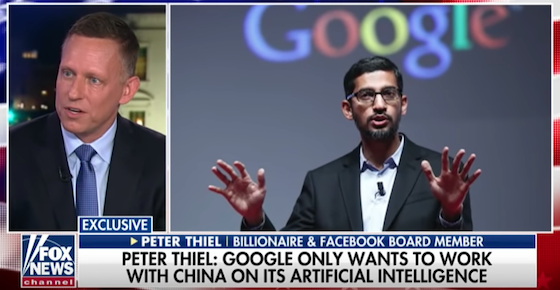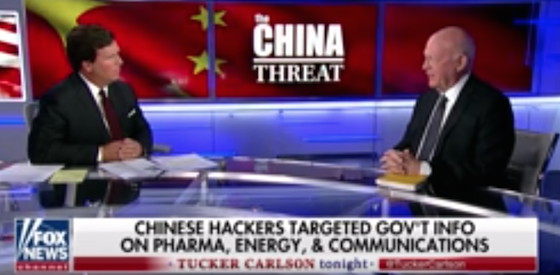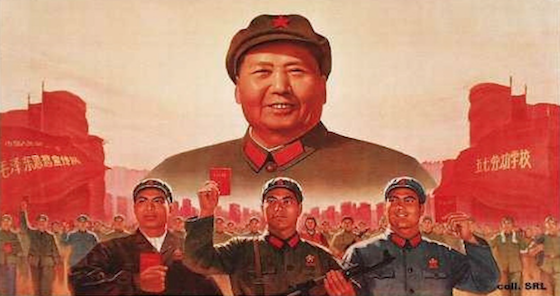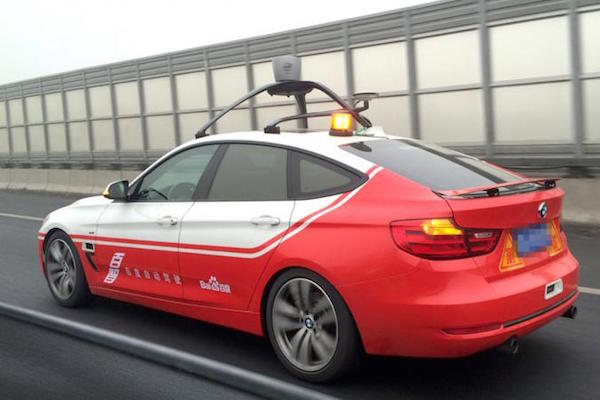He was a speaker at the National Conservatism Conference on Sunday and had three questions [...]]]>
He was a speaker at the National Conservatism Conference on Sunday and had three questions for Google:
“Number one, how many foreign intelligence agencies have infiltrated your Manhattan Project for AI?
“Number two, does Google’s senior management consider itself to have been thoroughly infiltrated by Chinese intelligence?
“Number three, is it because they consider themselves to be so thoroughly infiltrated that they have engaged in the seemingly treasonous decision to work with the Chinese military and not with the US military… because they are making the sort of bad, short-term rationalistic [decision] that if the technology doesn’t go out the front door, it gets stolen out the backdoor anyway?”
Tucker Carlson was the keynote speaker at the conference, so it worked out that Thiel appeared on his Monday show to discuss Google’s relationship with China.
Peter Thiel made serious charges against Google during his interview with Tucker Carlson.

Thiel’s charges have gotten the attention of President Trump who said on Tuesday the administration will investigate whether Google operated improperly with Red China.
In fact, Tuesday was not a great day for Google because the Senate Judiciary Committee held a hearing where Senator Ted Cruz and others grilled spokeman Karan Bhatia over the company’s search bias and censorship. In addition, a panel of critics appeared which included Dr. Robert Epstein who has developed unique techniques to investigate Google’s subtle but powerful election meddling.
Here are the video and transcript from Tucker’s discussion with Peter Thiel:
]]>TUCKER CARLSON: Peter Thiel cofounded Paypal. he was one of the very first investors in Facebook. If anyone knows about the power of big tech and its potential dangers, it’s Peter. So it means something when he warns that Google, the world’s most powerful company, has become a threat to American national security. They may even have even committed treason, he says.
While speaking at the National Conservatism Conference in Washington yesterday, he warned that Google may have been infiltrated by Chinese intelligence and ought to be subject to immediate investigation by the FBI and the CIA. We are happy to have Peter Thiel join us here tonight, Thanks a lot for coming on.
What did you mean when you said that?
PETER THIEL: Well, it was just in the form of a set of questions I asked. Artificial intelligence is something people talk about nonstop in Silicon valley, but they almost never talk about its dual use; if it’s real, if it’s a real thing, it can also be used by the military, it will be will be weaponized in all sorts of ways, and it’s an important national security question as to who has it.
There’s this very peculiar background where google is working with the chinese communist government, and not with the US military so the Project Maven was a decision not to work with A.I., with the U.S. military, but they’re working with the Communist Chinese, and so the question is, what in the world is going on there?
I sort of suggested a few different possibilities. But I think, you know, it’s been described as a Manhattan Project for A.I. So if you go around broadcasting that you’re building a Manhattan Project for A.I., I would think this naturally would draw the attention of foreign intelligence agencies.
I think the Chinese are confident enough, the Ministry of State Security is likely to have infiltrated Google, and I think the Google management has sort of a decision of either letting the software go out the front door, or figuring, it will get stolen anyway and go out the back door.
CARLSON: When you say you believe that Chinese State Security is likely to have infiltrated Google, what does that mean?
THIEL: Well, if you say you’re building a Manhattan Project for A.I., don’t you think that would attract the interest of foreign intelligence agencies?
It’s just hidden in plain sight. And then — well, I think there are sort of all these ways that Chinese nationals are engaged in espionage in the U.S. It’s understandable that China is doing that. They see themselves in a very serious competition with the U.S., but we’re not particularly on our guard about it, and if you have sort of a series of super futuristic tech projects that you’ve broadcast to the whole world, it’s at least a suspicion. And then the weird fact that’s indisputable, is that Google is working with Communist China, but not with the U.S. military on its breakthrough A.I. technology.
CARLSON: Why is that?
THIEL: Well, that’s the question. I think one explanation is they figure they have to, because if they don’t give it to them through the front door, it will get stolen through the back door. So the first answer is they have to.
And then I think of course, there’s probably you know, a broad base of Google employees that are ideologically super left wing, sort of woke, and think that China is better than the U.S. Or that the U.S. is worse than China. It’s always — it’s more anti-American than anything.
CARLSON: Always. But this is, by definition, a threat to American national security, as you point out. So if Sundar Pichai was sitting right here, what would you say to him?
THIEL: Well, I would say answer my three questions. How many foreign intelligence agencies have infiltrated Google? Have the Chinese, in particular, infiltrated? And why are you working with Communist China and not the U.S.? What is the reason you’re doing that?
CARLSON: Why do you think that — the questions you raise, and this is not in any way to minimize their importance — are kind of obvious questions; why hasn’t the US government ascertained the answers?
THIEL: Well, it’s possible that there are people in the U.S. government looking into it and they haven’t told us. But yeah, I think the FBI and the CIA would be the natural places to look into it. The FBI would look at it from the domestic side; the CIA would look at it from the outside and would try to look at seeing if from the outside, their people, you know, controlling people inside Google.
CARLSON: So if someone who’s — this is almost rhetorical — but as someone who’s built a lot of companies, as you have, do you think it would have been possible to create, to incubate and grow a company like Google in China?
THIEL: I think the U.S. is still better at innovation and at starting things, but it certainly can be copied and replicated. And something like this is true of all the breakthrough technologies we have. Most of them are still originating and developing in the West, but they don’t give us much of an advantage if they get transferred in a matter of a few years, if not a matter of months.
Lou Dobbs has long been a rare exception: he was reporting on China [...]]]>
Lou Dobbs has long been a rare exception: he was reporting on China espionage in 2007 with the crime of Chi Mak, an engineer who stole critical technology that allows submarines to run silently in a case that was then called “the most significant Chinese spying case in two decades.”
Dobbs also reported around the same time that Red China had 3000 front companies in the US for the purpose of stealing US technology and industrial secrets, so there have been plenty of crimes to investigate, but Washington wasn’t interested.
But more analysis and prosecution have been bubbling up recently during the Trump administration. One important case has been that of the Huawei tech mogul whose recent arrest in Canada made the Chi-Coms howl:
How arrest of Chinese ‘princess’ exposes regime’s world domination plot, By Steven W. Mosher, New York Post, December 22, 2018
Huawei executive Meng Wanzhou’s arrest in Vancouver on Dec. 6 led to immediate blowback.
Furious Chinese Communists have begun arresting innocent Canadians in retaliation. So far, three of these “revenge hostages” have been taken and are being held in secret jails on vague charges. Beijing hints that the hostage count may grow if Meng is not freed and fast.
Even for a thuggish regime like China’s, this kind of action is almost unprecedented.
So who is Meng Wanzhou?
Currently under house arrest and awaiting extradition to the US, she will face charges that her company violated US sanctions by doing business with Iran and committed bank fraud by disguising the payments it received in return.
But to say that she is the CFO of Huawei doesn’t begin to explain her importance — or China’s reaction.
It turns out that “Princess” Meng, as she is called, is Communist royalty. Her grandfather was a close comrade of Chairman Mao during the Chinese Civil War, who went on to become vice governor of China’s largest province.
She is also the daughter of Huawei’s Founder and Chairman, Ren Zhengfei. Daddy is grooming her to succeed him when he retires.
In other words, Meng is the heiress apparent of China’s largest and most advanced hi-tech company, and one which plays a key role in China’s grand strategy of global domination. (Continues)
On Thursday, Tucker Carlson interviewed Michael Pillsbury, a long-time critic of Red China and author of The Hundred-Year Marathon: China’s Secret Strategy to Replace America as the Global Superpower. Recent actions of the Trump Administration against Chinese thefts and espionage have put the topic more in the news, for which Pillsbury was grateful that the public would understand how China intends “to steal their way to global leadership.”

It’s definitely good that America is learning that the Chi-Coms are not our friends — maybe we could stop admitting them as students and immigrants.
TUCKER CARLSON: The Administration today issued a strong condemnation of a major foreign power that routinely hacks American infrastructure, steals national secrets, technology, personal information in huge quantities.
The Director of the FBI called this country the greatest long-term threat to America’s wellbeing. Russia, oh sorry, excuse me. China, misread that, for more than two decades now, of course, it has always been China, America’s greatest geopolitical rival.
You wouldn’t know that though from watching television. Even this week, with this new news about China, there’s only one foreign power on the radar considered a threat. You know what it is.
CHRIS CUOMO, CNN: The Russians exploited a massive backdoor into the foundation of our democracy.
UNIDENTIFIED MALE: Moscow’s attack on American democracy.
TONY ROMM, WASHINGTON POST: The work by Russian agents to try to destabilize American democracy.
DON LEMON, CNN: It’s everything you need to know about the threat to our democracy.
DAVID GERGEN, COMMENTATOR: The long-term damage is going to be to weaken our democracy.
ELISE JORDAN, MSNBC: You have Republicans who are silent and seemingly OK with this kind of attack on our democracy.
CARLSON: These people are so stupid it’s amazing they’re employed.
Michael Pillsbury, not stupid, and employed, Director of the Center for Chinese Strategy, the Hudson Institute, author of the remarkable book, The Hundred-year Marathon: China’s Secret Strategy to Replace America As the Global Superpower, a strategy no longer secret, thanks to his book.
Mr. Pillsbury joins us tonight. Thank you very much for coming on. So, this seems like a confirmation, this announcement today, of what we may have known, but still striking.
MICHAEL PILLSBURY: Yes. I think when the Director of the FBI calls China our main rival and then specifically said their goal is to replace us as the global superpower, that’s the subtitle of my book.
So, it’s not just good news for me though, Tucker. It shows the recognition of the problem of China is now getting quite widespread.
CARLSON: Give us a scale of the hacking efforts by the Chinese government here.
PILLSBURY: Well they’re number one, by far, more than the Russians. They have a number of techniques, some of which were revealed today, formerly classified matters. There’s this wonderful term, I hope you’ll start using called, Stone Panda. It’s the codename for the Chinese unit that’s been doing this.
CARLSON: Sounds like a restaurant but I like it.
PILLSBURY: And it seems to, according to this declassified material, it seems to go back 12 years. It seems to focus on American companies. The data that they stole then can help them in negotiations, business negotiations with American companies. They also get trade secrets.
It’s massive. And it seems to be focused on the high-end technology sectors that China would need to dominate by 2030 or 2035 in order to be the world leader. So, in other words, they’re going to steal their way to global leadership, let’s put it that way — it’s more polite than domination. And the FBI is blowing the whistle today along with the Deputy Attorney General.
The pity is, as you know from our local press, there’s been a big leak that Steve Mnuchin and the Treasury Department were going to offer sanctions today as punitive for these things that DoJ and the FBI are finding.
For some reason, at the last minute, Treasury pulled out, so they weren’t at the announcement and they’re not putting the sanctions forward. So, this leak shows dissent inside the Trump team.
And, of course, the Chinese have a strategy that Vice President Pence spoke about back in October that they want to divide the Trump Administration. They know they’re hawks and doves. So this is good news. It raises public awareness for what China is up to.
There were no actual sanctions announced other than the indictment of these two Chinese hackers out of possible 10,000 hackers, let’s say.
CARLSON: Meanwhile, there are calls for more Russia sanctions. It just tells you everything. Michael Pillsbury, thank you very much for this and all you’ve done on this topic.
So, you can’t exactly call the increased enforcement a “crackdown” but it’s been a start.
]]>DOBBS: Three thousand front companies we know of, Chinese front companies, trying to [...]]]>
DOBBS: Three thousand front companies we know of, Chinese front companies, trying to steal American industrial secrets, in addition to the effort to steal U.S. technology.
Now, what I find particularly galling about this is that the president of the United States and neither the House speaker nor the leader of the Senate, is addressing this issue publicly. And everyone knows it’s going on. We’re reporting it on this broadcast.
It’s incredible.
On Wednesday, Lou Dobbs was still the diligent watchdog, reporting the news that 10 Chinese spies have been charged with hacking US companies trying to steal jet engine technology. “It’s only now that we’re beginning to take action against them,” he observed.
Red China seems not to have changed that much at the core.

One very open doorway for stealing US knowledge is through the universities:
Chinese military researchers exploit western universities, FT.com, October 28, 2018
Study shows US and UK scientists aiding high-tech progress for People’s Liberation Army
China has sent thousands of scientists affiliated with its armed forces to western universities — especially in countries that share intelligence with the US — and is building a web of research collaboration that could boost Beijing’s military technology development.
About 2,500 researchers from Chinese military universities spent time at foreign universities — led by the US and UK — over the past decade, and many hid their military affiliations, according to a new report from the Australian Strategic Policy Institute (ASPI), a think-tank partly funded by Australia’s department of defence. (Cont.)
A CNN article about the Chinese military infiltration remarked that these activities are described as “picking flowers in foreign lands to make honey in China.”
]]>In fact, China’s tech giant Baidu has set up a Silicon Valley office in Sunnyvale, California, that employs 160 workers, many of whom are working on the car project.
The [...]]]>
In fact, China’s tech giant Baidu has set up a Silicon Valley office in Sunnyvale, California, that employs 160 workers, many of whom are working on the car project.
The ChiComs are quite energetic in stealing American technology from afar via the internets, but a Silicon Valley location will open up more personal spying opportunities — and China is expert at traditional espionage as well.
An NBC report from last July observed extensive cyber-spy activity, with a map showing how Chinese hackers have breached US cyber-security more than 600 times in the past five years to steal secrets:
This National Security Agency map shows a red dot for every successful computer intrusion by China over the past five years — nearly 700 with computer attacks in every state but North Dakota. The northeast corner from Washington to New York is a massive blob red and intrusions are clustered around California’s Silicon Valley, the aerospace regions in the Pacific Northwest and Southern California’s defense industrial base.
Besides the increased Chinese espionage opportunities of its California foothold, the entrance of self-driving cars into the economy generally means a large employment category faces obsolescence from automation: more than three million Americans have jobs as drivers.
Below, the Chinese Baidu company’s self-driving car.

The recent Reuters report about ChiCom self-driving cars observes that the People’s Republic could be advantaged by its “regulatory structure” — does that mean fewer lawyers and less supervision regarding safety? The PRC certainly benefits by operating more pollution-spewing industries, unencumbered by annoying environmental regulations which enable the Chinese to manufacture more cheaply than America. (Funny how transnational trade deals never include the pollution factor.) Even the upbeat Reuters report noted China’s “choking air pollution.”
]]>Look Mao, no hands! China’s roadmap to self-driving cars, Reuters, April 22, 2016
In the race to develop self-driving cars, the United States and Europe lead in technology, but China is coming up fast in the outside lane with a regulatory structure that could put it ahead in the popular adoption of autonomous cars on its highways and city streets.
A draft roadmap for having highway-ready, self-driving cars within 3-5 years and autonomous vehicles for urban driving by 2025 could be unveiled as early as this year, said Li Keqiang, an automotive engineering professor at Tsinghua University who chairs the committee drafting the plan. The panel is backed by the powerful Ministry of Industry and Information Technology.
The draft will set out technical standards, including a common language for cars to communicate with each other and infrastructure, and regulatory guidelines – a unified framework that contrasts with a patchwork of state laws and standards in the United States.
Without coordination, that patchwork could hold back the development of self driving cars in the U.S., David Strickland, a former safety chief for the National Highway Traffic Safety Administration, said at an event in Beijing this month.
China’s top-down approach could see it overtake the U.S. and Europe, where automakers have generally been left to agree among themselves on industry standards. A push for self-driving and electric cars also fits with Beijing’s shift to an economy driven by high-tech and consumer industries rather than heavy industry and low-end manufacturing.
“If we can convince the government that every company, every car on the road must use this (single standard) … then there is a chance China can beat the rest of the world” to the widespread use of self-driving cars, said Li Yusheng, head of Chongqing Changan Automobile’s autonomous drive program.
China is ripe for the advent of self-driving cars. It’s the world’s biggest autos market and is blighted by choking air pollution, traffic congestion and often erratic driving. More than 200,000 people die each year in road accidents, according to World Health Organisation estimates.
As relative newcomers to mass car ownership Chinese also tend not to share the West’s love affair with driving. In a 2015 World Economic Forum survey, 75 percent of Chinese said they would likely ride in a self-driving car, versus half of Americans. Within 20 years, China will be the largest market for autonomous features, accounting for at least a quarter of global demand, says Boston Consulting Group.
BIG AMBITIONS
The China draft would be opened up for industry comment and input from a range of ministries, ultimately going to the State Council, or cabinet, for approval.At a most basic level, the committee will define a ‘self-driving’ car and set a minimum level of functionality, said Bai Jie, a professor at Tongji University who also sits on the expert committee.
In other respects, China plans to be more ambitious. It may adopt cellular data technology – already used in many cars to access the Internet – for cars to communicate, rather than the dedicated short-range communications (DSRC) standard used in the U.S. and Europe, said Li, the panel chairman.
“The U.S., Europe and Japan spent so much time developing DSRC, so they strongly recommend it for China,” Li said. “Here, we’re just beginning so why not choose advanced technology like LTE (Long Term Evolution wireless broadband technology) or 5G?”
China’s provisional timeline would put it at least in line with, if not ahead, of others developing self-driving cars.
By 2020, Toyota Motor aims to market a car that can drive by itself on highways, and Mercedes, after two decades of research, plans to launch a self-driving car, though drivers would be required to take control in certain situations.
Chinese automakers including SAIC Motor and Ford Motor’s local partner Changan have internal targets that match the likely draft roadmap, and are represented on the experts committee, Li said, while foreign car makers are not.
SELF-DRIVE TRIP
To be sure, China has some way to go to become a global pacesetter in autonomous driving.Li, the committee chief, said the panel was only now looking into legal issues around self-driving cars, such as who is liable in any collision.
Li Shufu, chairman of automaker Geely [GEELY.UL], has said China must revise its laws so the manufacturer, not the driver, is held responsible for accidents when a car is in self-drive mode. “If (our) legislation lags behind, self-driving cars will be difficult to sell in China,” he said.
“It’s certainly possible for the Chinese auto industry to make significant headway with government backing, but there’s still a lot going into developing that technology, making sure it’s safe, and that means a certain number of miles driven,” said Jeremy Carlson, an analyst at consultancy IHS Automotive.
Ahead of next week’s Beijing autoshow, Changan took a couple of its prototype self-driving sedans for a 2,000 km (1,243 mile) trip from its Chongqing headquarters to the Chinese capital.
With a test engineer behind the wheel, but with his hands in his lap, the automated system guided the car along the highway at 80 km per hour, adjusting speed for traffic and speed-limit signs, while keeping centered in its lane – roughly on par with the self-drive capabilities of Tesla models already on the market.
Changan’s Li said a self-driving model should be on the market in 2-3 years, with the automaker spending 5 billion yuan ($773 million) to further the technology by 2020. It is also in talks with Internet giant Baidu on developing automated driving technology.
“The intersection between technology companies and automakers is the space to watch,” said Wang Yanmin, a professor at Beijing Normal University.